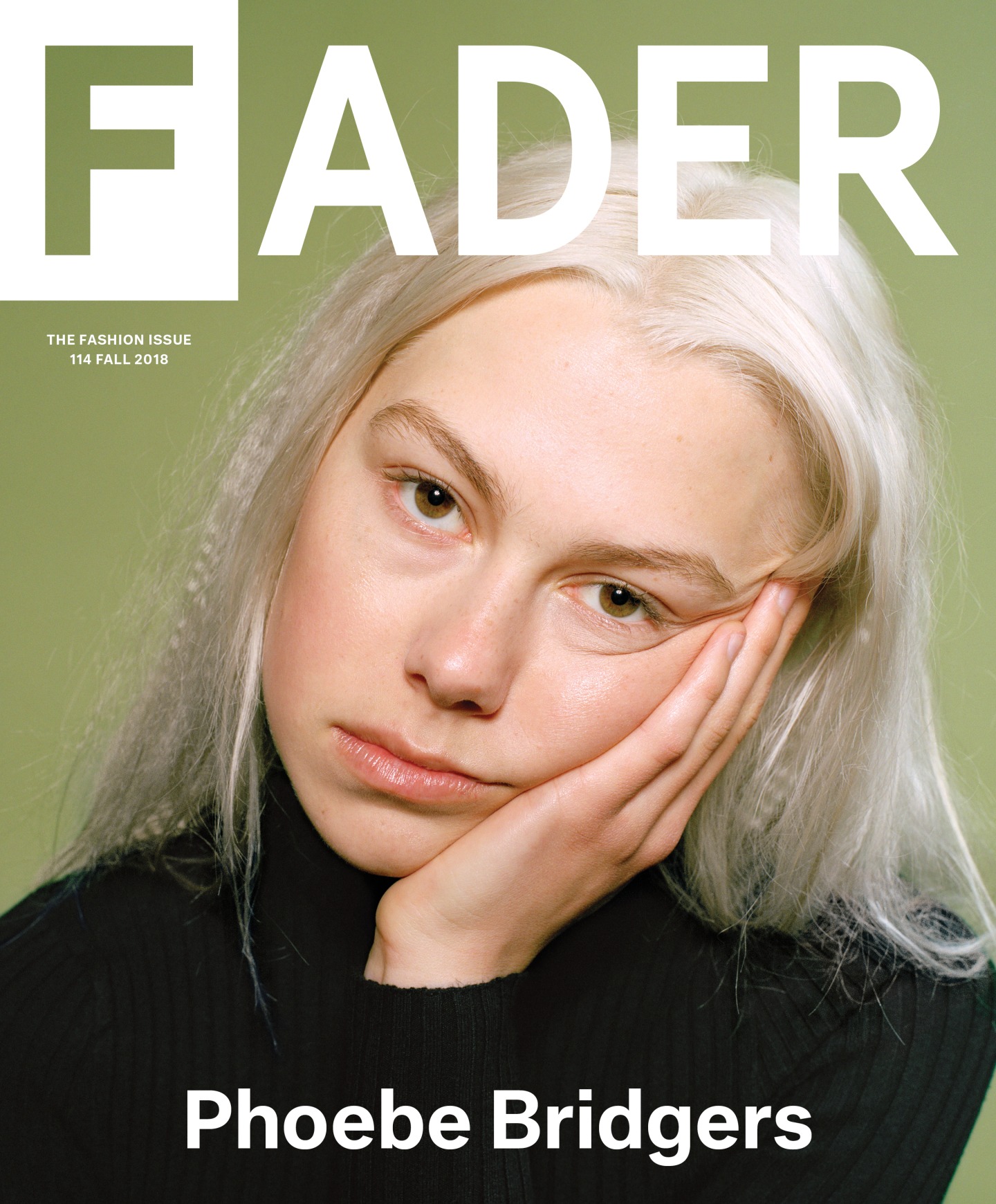
Buy a print copy of the Phoebe Bridgers and Bad Bunny issue of The FADER, and order a poster of her cover here.
In 2017, a relatively unknown artist named Phoebe Bridgers released her debut album, Stranger in the Alps. She sings dark folk-rock lullabies about funerals and wanting to die, yet still manages to work in backhanded digs at past romances among the devastation. It’s a deep, well-rounded LP. Still, making a career as a “female-singer-songwriter” is like trying to slice through a wall of rubber with your fists. You need a knife. Fortunately, years of charming her way through the Los Angeles indie music scene grew little blades into Phoebe’s fingers.
“Jesus Christ, I’m so blue all the time / And that’s just how I feel / Always have and I always will,” she sings with an old-soul maturity that can make her seem almost ageless. It’s not that Phoebe is more serious or aching than other 24-year-olds, she’s just relentless in confronting the uncomfortable realities of life. In a culture obsessed with confessional oversharing, Phoebe Bridgers makes sense: one part @sosadtoday, one part Leonard Cohen.
This October, Dead Oceans, the indie label that put out Stranger, will reissue a special edition featuring a Tom Petty cover and a demo version of “Motion Sickness.” On that anthemic first single, Phoebe drills into the aftermath of unbalanced lust: “I hate you for what you did / And I miss you just like a little kid.” But unlike her peers, Phoebe’s romances aren’t with just anyone. “Motion Sickness” is about Ryan Adams, the 43-year-old Grammy-nominated indie star who produced her first EP, Killer, and released it on his label.
Sometimes Phoebe’s entire path to the limelight sounds like a name-dropping contest. At 13, Carla Azar of Autolux introduced her to the music of Elliott Smith. She learned the banjo from Ben Harper’s mother. Conor Oberst featured on her album and duets at shows. Her lawyer was in The Lemonheads. She appeared in two Apple commercials and helped Jackson Browne figure out his iPhone at an Escape Room party.
Over the past year, as Stranger spread like wildfire, as much as a quiet folk-rock album can, some were suspicious, with one music critic tweeting, “with a raise of your digital hand, who is on team ‘phoebe bridgers is an industry plant.’” This is a common reaction when you are talented, young, hot, and a woman: there must be a catch, because this chick is too good to be true. But there’s no catch with Phoebe Bridgers. Her success story is the original formula: a healthy mix of talent, knowing the right people, and relentless hard work.

In 1995, eight months after Phoebe was born, her mother, Jamie Bridgers, got a job as the nighttime house manager of the fine arts complex at the University of California, Irvine. The Bridgers lived just across the street — her dad was a scenic carpenter for movies and TV — and Jamie could take her infant daughter with her to work. As she shuffled around the auditorium, placing microphones and organizing chairs, a professional would come in to tune the piano. “Phoebe loved it,” Jamie recalls. “She would just stare at the piano, listening and totally mesmerized.”
Phoebe grew up with her younger brother Jackson, named for Jackson Browne, in a home filled with vinyl records: Joni Mitchell, Hank Williams, the Pretenders, Dar Williams, and Neil Young. As she got older, she would learn her favorite songs on piano and her guitar, a Spartan acoustic gifted by a family friend, “Uncle Dave,” when she was 11. “I don’t remember making a decision about music,” she says now. “I just always knew it was what I was going to do.”
First, she wanted to go to the Los Angeles County High School for the Arts, a public school you have to audition to attend. For an entire year, she prepared her try-out, a three-part rendition of Stephen Foster’s “Hard Times Come Again No More,” with each part showcasing a perfected version of gospel, Americana, and folk. When the day finally came, Jamie says, Phoebe walked out of the audition, rattled, with big glassy eyes — the judges had stopped her after just a single verse. That could mean one of two things: they loved it or hated it. They loved her. She was in.
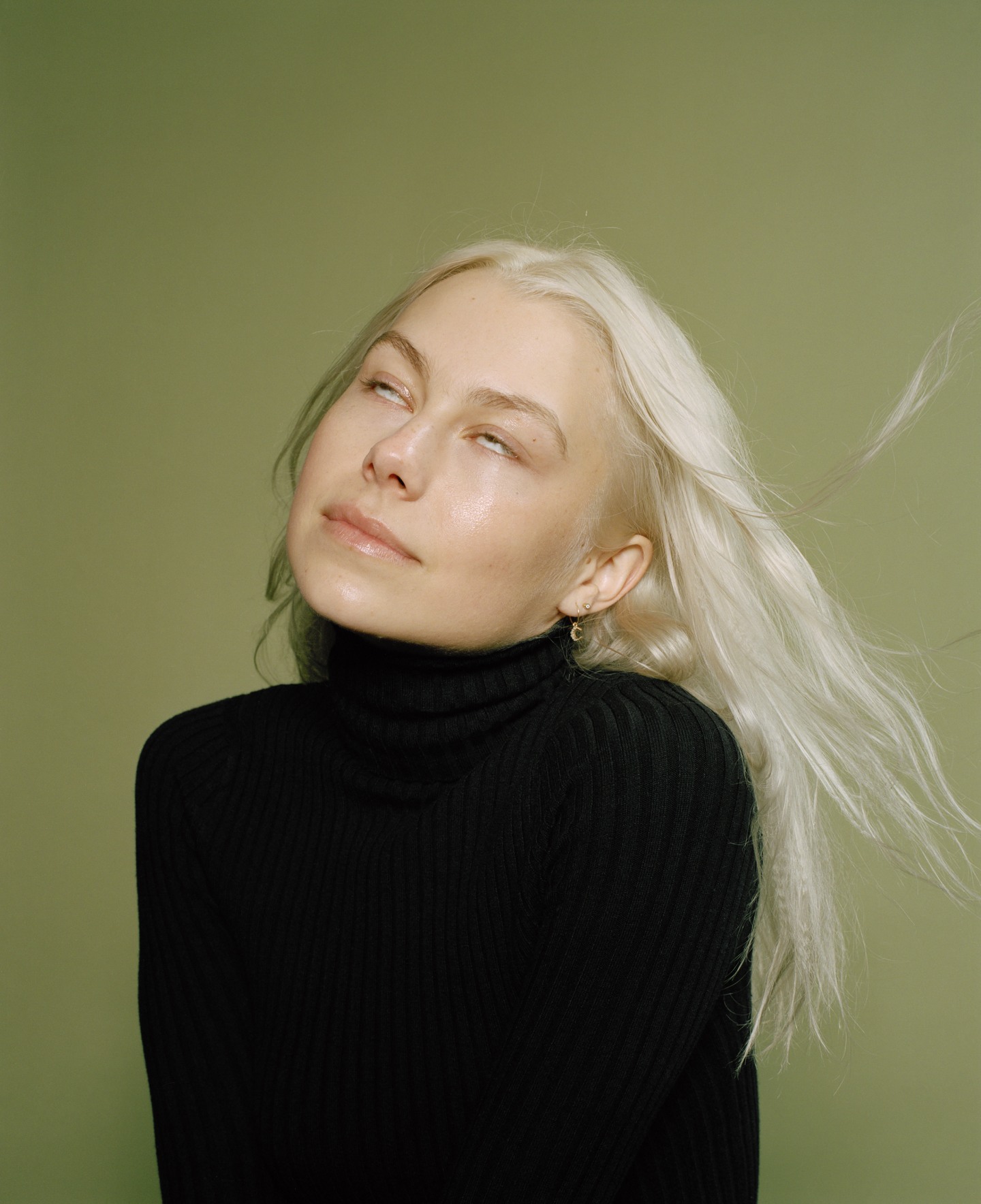 Sweater GIU GIU, earrings PHOEBE’S OWN.
Sweater GIU GIU, earrings PHOEBE’S OWN.
“I just want everyone to know, which is what everyone already knows: everyone is everything all the time.” —Phoebe Bridgers
Jamie was the kind of mom who encouraged Phoebe to earn spending money by busking at the Pasadena Farmers Market — a gig Phoebe says taught her to relax while performing because “no one gave a shit” when she was singing on the street. She took her to the Folk Music Center in Claremont so she could learn the banjo and pushed her to take any show she was offered, even if it was playing at someone’s backyard birthday party. She made playlists of Beatles demos on Phoebe’s iPod and took her to see live music at any chance she got. “My mom was almost too supportive,” Phoebe laughs. “I thought I was the shit before I was good at all.
While it appeared fine on the outside, things weren’t great in the Bridgers home. Though her parents’ marriage had started off well, Phoebe says, her father eventually became abusive, inflicting what she refers to as “textbook domestic violence.” Her parents didn’t divorce until Phoebe was 19, but looking back, she realizes why her mother was so willing to get in the car at a moment’s notice. “There was an element of having to escape the family dynamic,” she says. “I think that’s why she drove me to concerts and went out of her way. We were both kind of escaping.”
When puberty hit, so did Phoebe’s punk phase. So while she began to develop her own, quieter songs — “Georgia,” for example, is from this time, about an early boyfriend who “never lies or picks up his phone” — in 2012 she also joined a band called Sloppy Jane: “I played bass, horribly.” They performed around Los Angeles, gathering attention for wild performances where frontwoman Haley Dahl would often strip naked, ooze paint out her mouth, and throw herself into the crowd like a plastic doll. “Haley is still my best friend,“ Phoebe says, even though “Sloppy Jane is so different than my world.”
Sometimes they would finish their set with a Teletubbies cartoon looped on a small TV behind them on stage. All the girls would kneel down on the floor like yoga instructors and wait it out to see what the audience would do. “We were basically calling people out on their art rock shit,” Phoebe says. Once, she had an 8 a.m. recording session, or something of note — she can’t remember now — and eventually she had to go, sneaking off stage while lingering distortion rang out. That night, she got a text message from Robb Nansel, the founder of Saddle Creek Records: “Did I just see you on stage right now?”
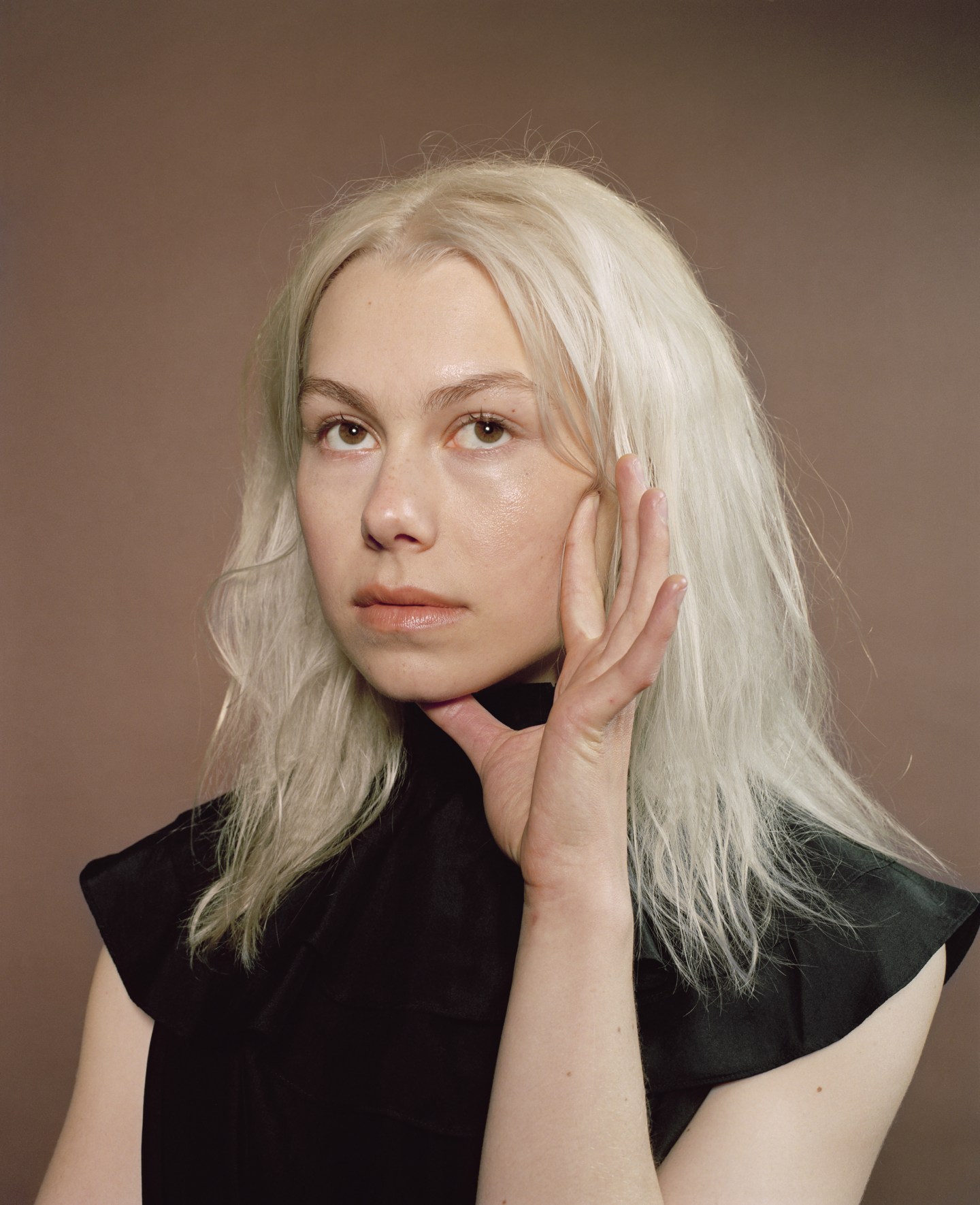 Dress JW ANDERSON.
Dress JW ANDERSON.

 Sweater ACNE STUDIOS, coat MANSUR GAVRIEL, jeans LEVI’S, choker EYDE.
Sweater ACNE STUDIOS, coat MANSUR GAVRIEL, jeans LEVI’S, choker EYDE.
When I meet Phoebe Bridgers at a small, busy cafe in Highland Park, she has just come from a long morning at the courthouse. She had to prove that her car was registered in L.A. County to reduce a fine, and for someone who has been in court all morning, she’s in a good mood, greeting me with a warm smile and her recommendations from the menu: the quinoa salad, a vegan-egg thing.
Phoebe is dressed in all black, which accentuates her pale, ghostly features, and our conversation quickly turns to Elliott Smith, one of her favorite musicians. I’m convinced her song “Scott Street” is an ode to his “St. Ides Heaven,” from 1995. “Walking Scott Street feeling like a stranger / With an open heart, open container,” she sings, evoking his version of the punchdrunk stroll: “Everything is exactly right / When I walk around here drunk every night / With an open container from 7-11.” Better yet, his line “You see me smiling, you think it's a frown turned upside down” is just the sort of thing Phoebe would have written had she thought of it first — even when she seems sad, it’s hardly the whole story.
Anyway, a few years ago, Phoebe was out to lunch with her mom in Silver Lake and realized that the Figure 8 mural was only a quarter-mile away. At the thought, she says, she burst into tears. “I don’t think I ever imagined him as an entity that was real and close to my life,” she explains. “Living in East L.A., you walk around and people say things like, ‘Oh, that was his favorite bar,’ or, ‘He used to do that walk every morning.’ I realized that had he not died, I would have fully run into him at some point in my life.”
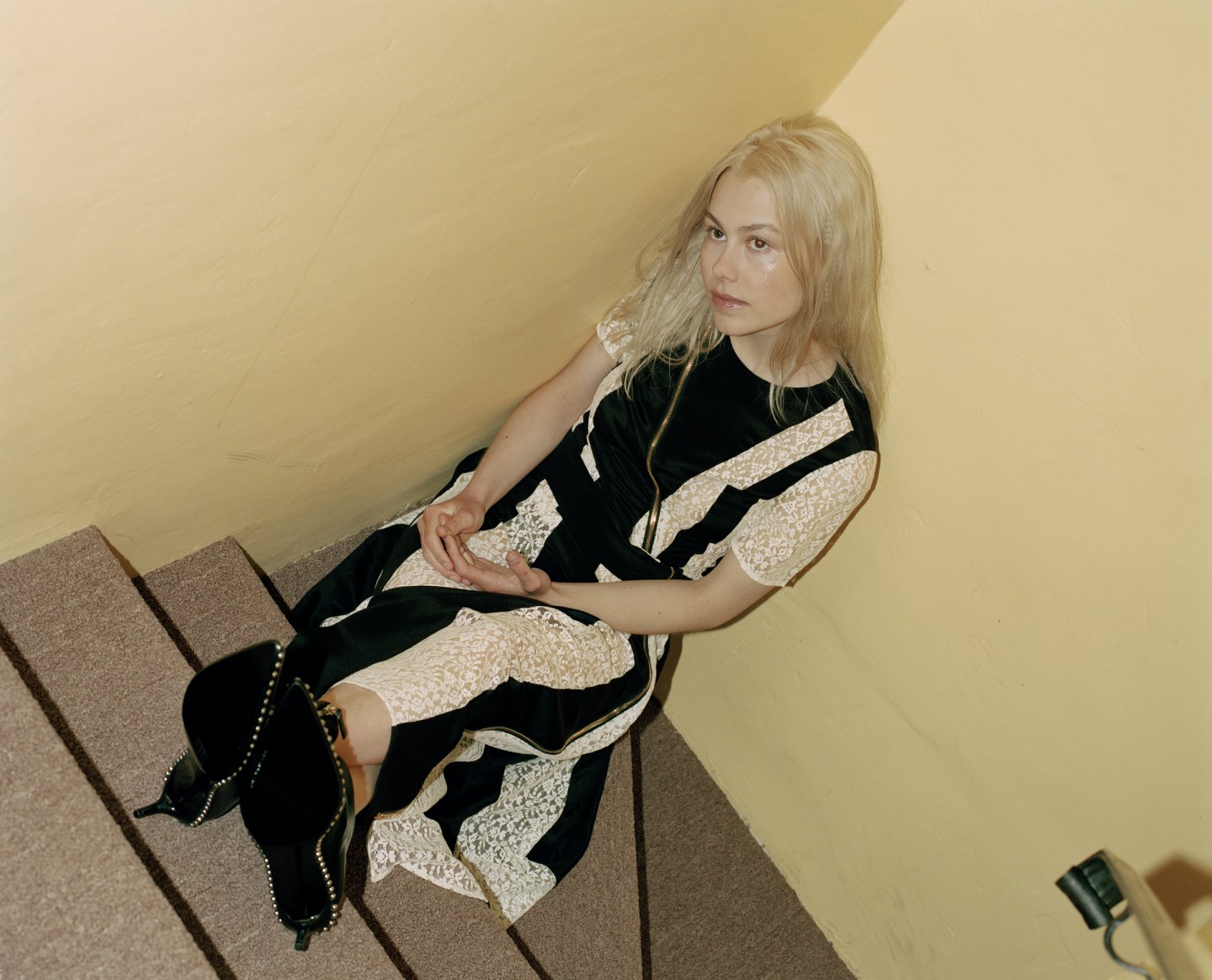 Dress STELLA MCCARTNEY, shoes ALEXANDER WANG, rings EYDE.
Dress STELLA MCCARTNEY, shoes ALEXANDER WANG, rings EYDE.
Phoebe is the first to admit that her career opportunities would look very different had she grown up in Dripping Springs, TX, and not Pasadena, CA. “It obviously informed the way I came into music and who I know, because not everyone has a friend with a dad in a famous band,” she tells me. At the same time: “My songwriting is very personal. The music that influenced me was so impactful that had I grown up somewhere else, I know I would still write the same way I do because of those influences.”
Life in L.A. helped in other ways, too. In 2014, a family friend of the Bridgers who worked for a casting agency came to see Sloppy Jane play. There was an iPhone commercial that needed to be cast ASAP, and the all-girl punk band was just what Apple wanted. Sloppy Jane went in for an audition and was immediately offered the gig, but Haley was hesitant: a commercial was selling out. So Phoebe stood in as the lead singer.
The iPhone ad led to spots for the Apple Watch, Home Goods, Quickbooks, and Taco Bell — you can find the clips online, where she hosts a retro dinner party or munches a chip over the big word “NACHOS!” The companies wanted actors who personified “edgy, Silver Lake millennials,” Phoebe says, and she laughed at the roles while happily taking the cash. Everything she earned went toward her album, whether it was saving up for studio time or buying an old Volkswagen so she could get herself to shows.
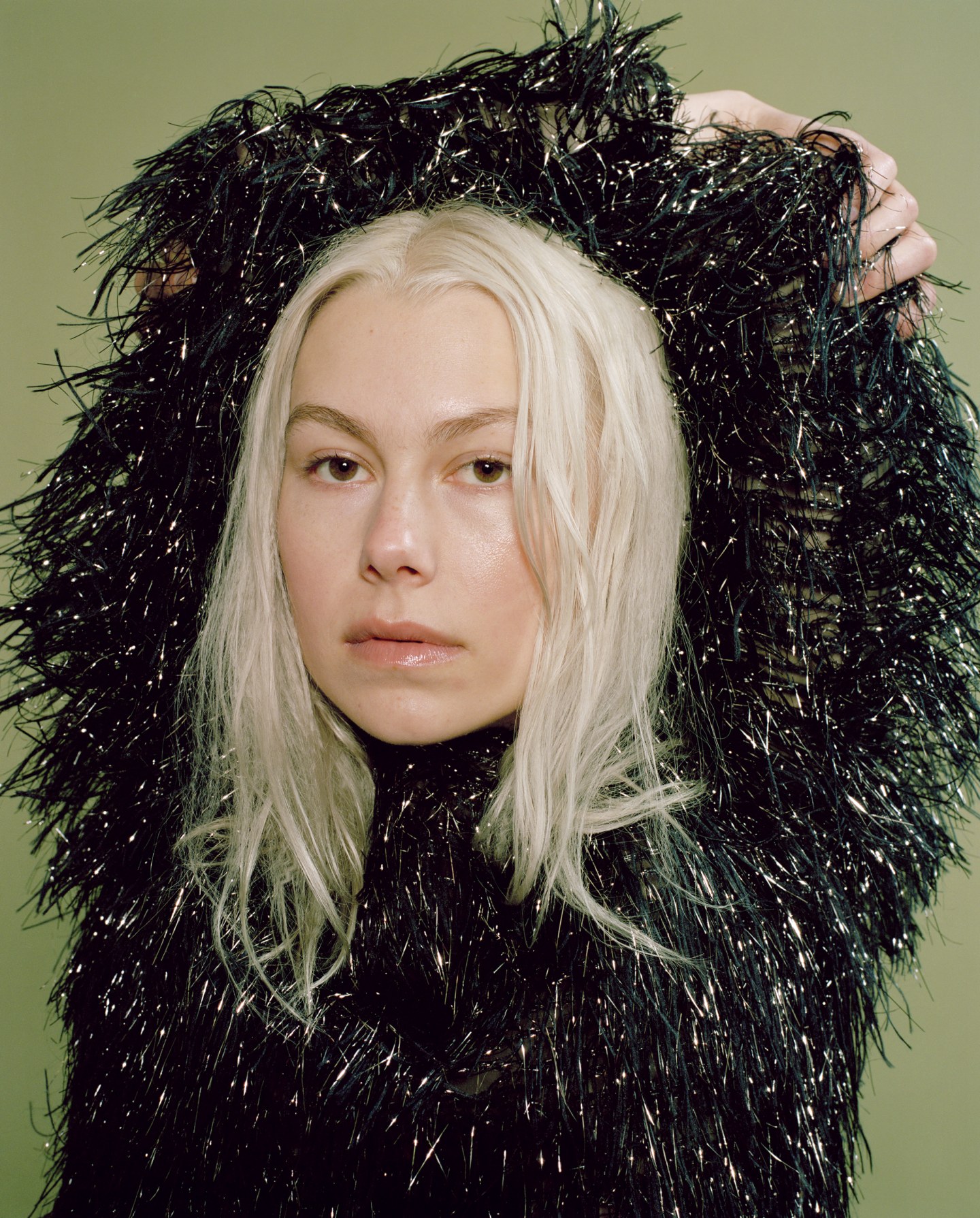 Sweater MANSUR GAVRIEL.
Sweater MANSUR GAVRIEL.
At an open-mic show, she caught the attention of a talent scount for Linda Perry, a multi-hyphenate producer and songwriter who has worked with everyone from Courtney Love to Christina Aguilera. “She was trying to put me in this movie,” Phoebe casually recalls. Jamie called Phoebe in sick for school so she could take a meeting.
“It was myself and another actress," she says. "Then I met with the producer. He had obviously had some minor success because he had boy-genius vibes.” She rolls eyes her eyes and laughs. “He says, ‘The reason you two are so great is that you are both attainable. Like, I’m a kid and I’m watching the movie and know I could sleep with you.'”
Phoebe shakes her head in awe. “I was relieved,” she says. “It was a very viable excuse to not do the movie, because it sounded horrible anyway. It’s very rare that such a cookie-cutter sexist thing happens to me. Had I not been confident, I probably would have gone home and cried.”
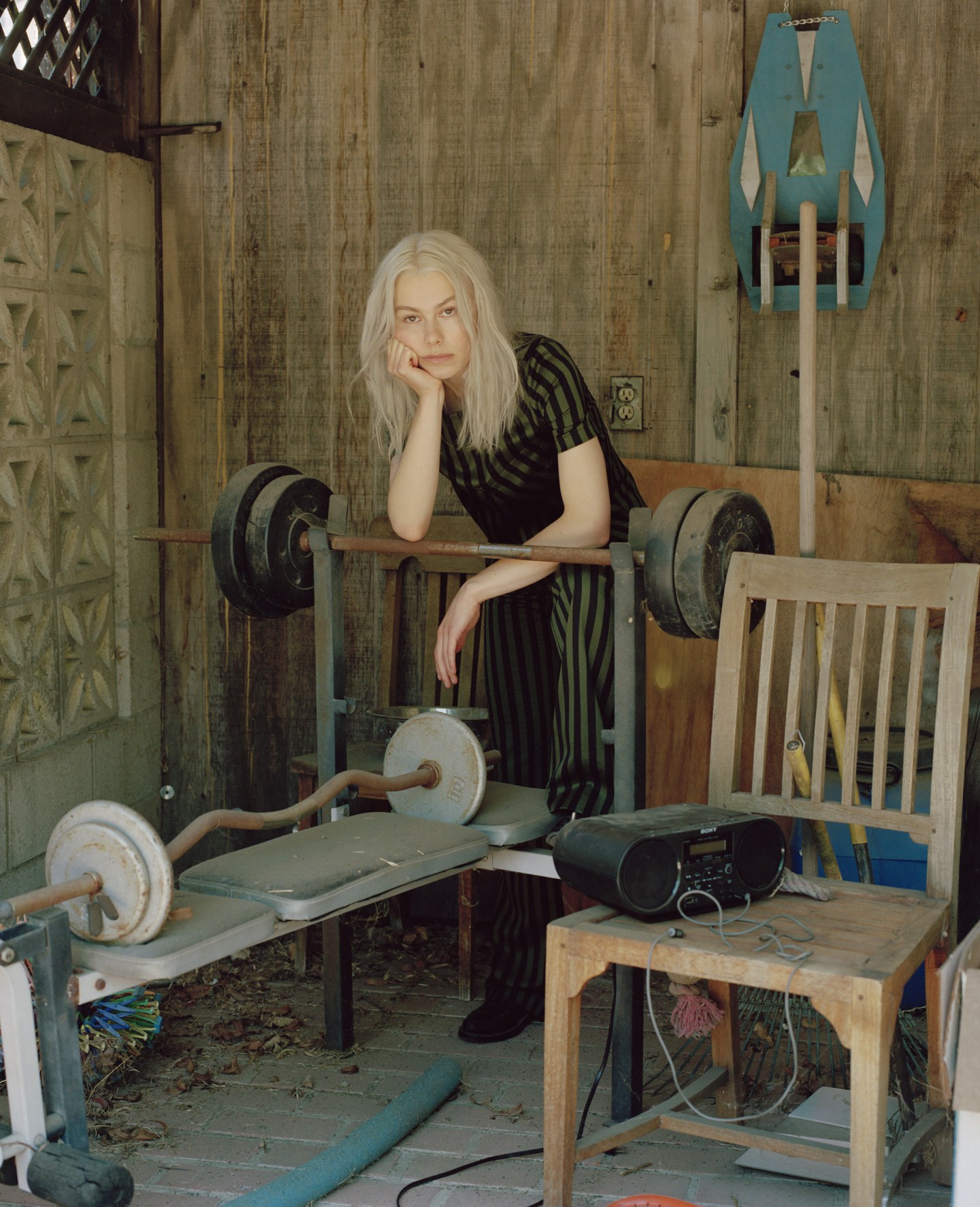 Top ALTUZARRA, pants ALTUZARRA, jewelry PHOEBE’S OWN, shoes PHOEBE’S OWN.
Top ALTUZARRA, pants ALTUZARRA, jewelry PHOEBE’S OWN, shoes PHOEBE’S OWN.


In between bites of her salad, Phoebe gets pensive when she tries to remember the exact details of how she met Ryan Adams. It was a few years ago, and she had been playing gigs any chance she could: The Grand Ole Echo at the Echoplex, the Bootleg, and local festivals like Echo Park Rising. “I played at Room 5 a lot, which is probably the smallest capacity venue in Los Angeles,” she says. “I begged my friends to come see me.”
Those shows are how she met her musical collaborator and close friend, Harrison Whitford. One day, Harrison happened to take Phoebe to Ryan’s studio. She played a song for him, and Ryan was spellbound. “Meet me here tomorrow at 4 p.m. and we’ll record,” she remembers him saying. He called her “the next Bob Dylan” — “It’s obviously grand and insane, but I appreciate what he means by it,” she laughs. “He says different shit to different people. It was a hilarious, tailor-made compliment, Bob Dylan is Bob Dylan, but I hope to live up to it in some ways. It was definitely cool to hear at, you know, 20.”
Though their relationship began as a mentoring friendship, Ryan soon started coming on to her. She was freshly dumped by her first love and vulnerable yet, as she told the Telegraph, “super-down” for it. They hooked up on the night of his 40th birthday.
“And why do you sing with an English accent? / I guess it’s too late to change it now,” she sings on “Motion Sickness.” “You said when you met me you were bored / And you, you were in a band when I was born.” The song is the epitome of confession-meets-comedy, a big “fuck you” delivered with a wink and a kiss. “How do you hate someone and love them at the same time?” Phoebe says now. “It’s so ridiculous.”
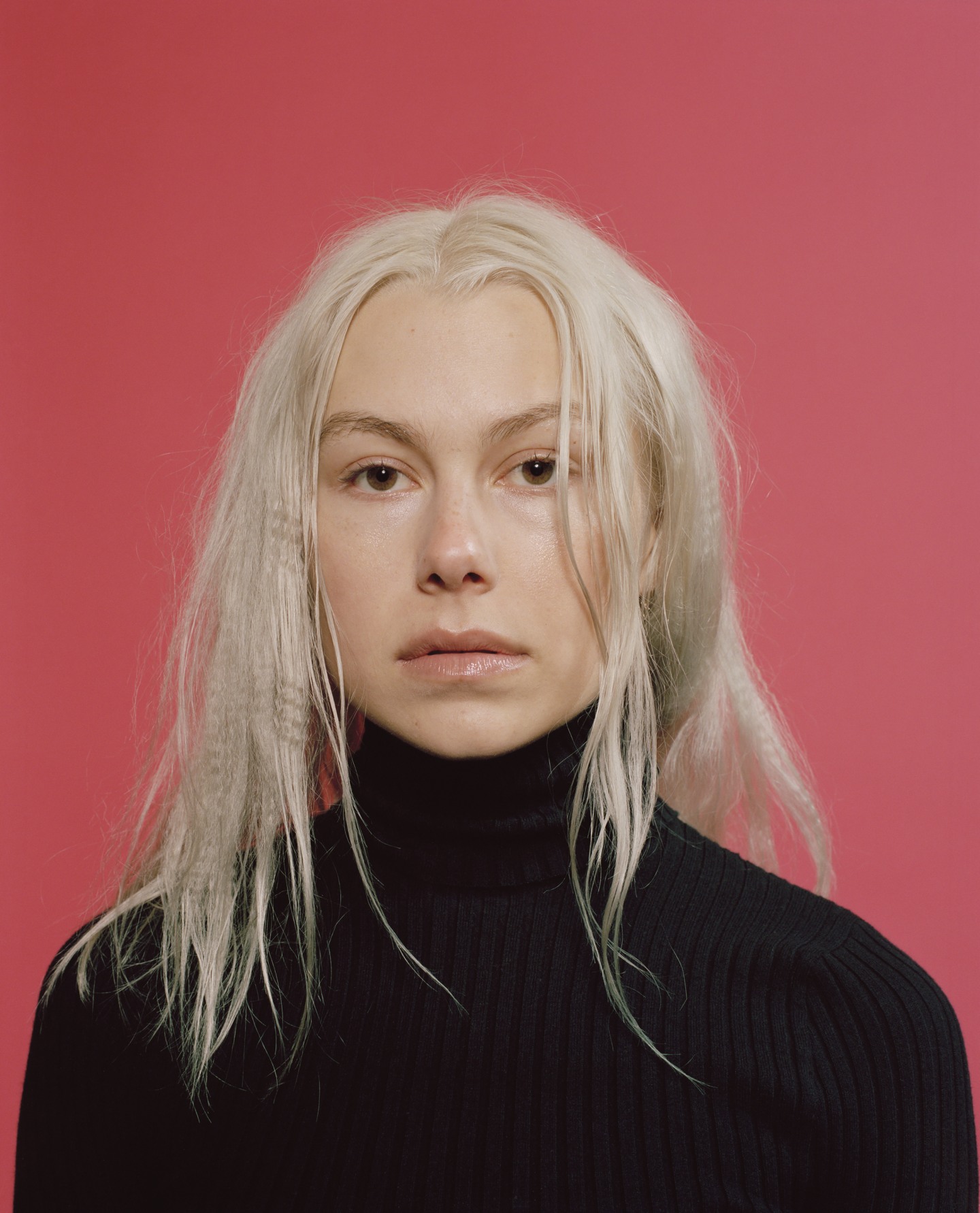 Sweater GIU GIU.
Sweater GIU GIU.
Around the same time she met Ryan Adams, Phoebe also met the producer Tony Berg — a veteran A&R who’d produced for unlikely-seeming stars like Public Image Ltd., X, and Aimee Mann, and would eventually work with her on Stranger. She got a manager, Darin Harmon, after he had seen her play to another small crowd of 20 or so people. Julien Baker brought her on tour and introduced her to her public relations team. “It kind of happened all at once,” Phoebe says. But she wasn’t truly starstruck until she was asked to open for Conor Oberst, the Bright Eyes frontman, whose iconoclastic brand of emo-folk heavily inspired her own music. Even today, now that she considers Oberst her good friend, Phoebe grins at the memory like she’s got a coat hanger stuck in her mouth.
“It was a secret show at the Bootleg,” she says. “Kyle, who runs this production company called Sid the Cat, knew I was a huge Bright Eyes fan and pushed for me to open. Conor was playing solo under some crazy name like Crawdaddy Lafayette, and I was so nervous.” She recalls being on stage in the modest venue, performing as if detached from herself and watching Conor standing in the audience out of the corner of her eye. “He was wearing a jean vest,” she laughs. “Very controversial.” Afterward, the two exchanged information and he asked her to send him Stranger, which had yet to be mixed.
“He sent me this crazy long, epic, sweet email telling me what he thought of my album,” Phoebe says. She frantically scrolls through her phone, trying to find the message. “Meant to write and tell you how much I have been listening to your cuts,” she reads. “They keep growing on me and get stuck in my head. It’s nice to know you are out there singing this stuff. I think lots of people will find good comfort in your songs. They are soothing and empathetic, which I know I need more of in my life. Anyways, I don’t want to blow a bunch of smoke up your ass, but it’s true.” Phoebe sighs. “That’s what he said. So very sweet.”
Not long after, Phoebe was off to Omaha to mix Stranger with Bright Eyes’s Mike Mogis. The superfan inside of her was doing summersaults.
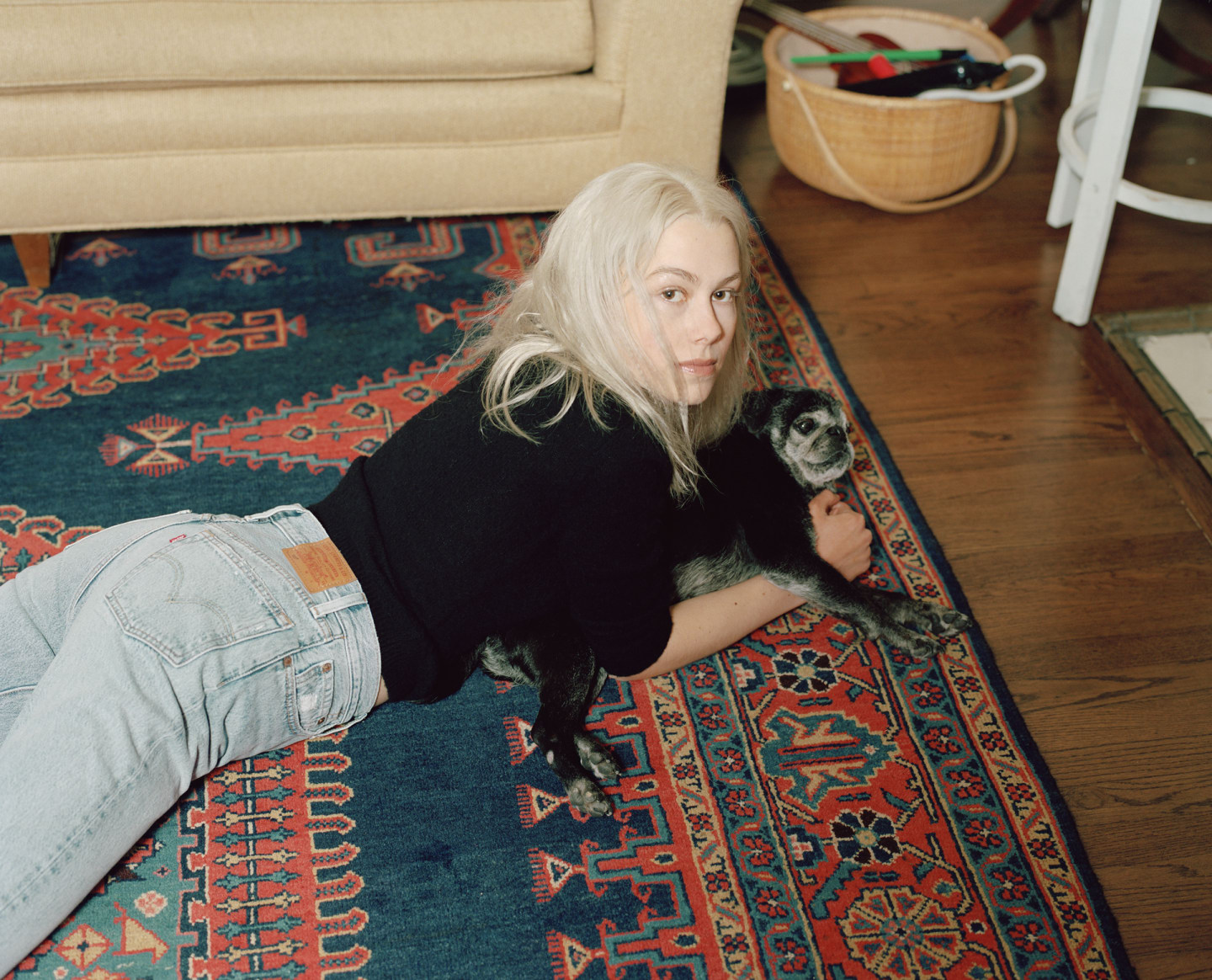 Sweater ACNE STUDIOS, jeans LEVI’S.
Sweater ACNE STUDIOS, jeans LEVI’S.
Though Phoebe is introspective and serious in her songs, in person she’s always cracking jokes. She talks quickly, darting off into weird tangents about everything from the threesome she was propositioned with after a show one night to shit anxiety.
“Do you get the pre-show poops?” she asks at one point, like it’s a request to pass the salt. I’m shocked, but also delighted. No, I say, but I tell her I couldn’t shit in a public bathroom until I was 18. Phoebe one-ups my insanity: when she was in high school, she says, she used to walk across campus to use the private handicapped bathroom and she would take her shirt off, like George Costanza.
“I’ve always found it strangely attractive in people when they can just say like, ‘Oh, I’ll be right back. I have to shit,’” she concludes. “It makes me feel relaxed around them.” On her phone, she pulls up a press release she made, compiling compliments about her music from reputable sources like the L.A. Times and The Line of Best Fit, plus a quote from Phoebe herself: “I pee in the shower 100% of the time.”
“Me writing sad songs doesn’t mean I am a sad person. I am not going to be moody all the time just for a brand.” —Phoebe Bridgers
When Phoebe was 18, an executive from a record label that was courting her told her that she needed to be “darker” on her Twitter account, because her online humor didn’t match her songs. “But me writing sad songs doesn’t mean I am a sad person," she says. "It’s all real and true, and I suffer, but I am not going to be moody all the time just for a brand. I just want everyone to know, which is what everyone already knows: everyone is everything all the time.”
That reminds me of something her mom told me. During our conversation, at one point, she stopped joking about Phoebe as a kid and spoke about her as a woman. “Phoebe can be humorously self-deprecating,” Jamie said. “She’s funny, but then she writes these painful songs, and they are about her life. They are about her experiences in our family. It can really be weird to listen to. She and her brother, I love them more than anything on the planet — to see her sing a song about our life that is really sad. But in a great way, it gets it out. I really respect her for being able to tell the truth like that. It’s really hard to touch that nerve.”
But Phoebe is not alone in this. She says she is constantly “starstruck by her friends,” gushing about Japanese Breakfast, or Soccer Mommy, or Snail Mail — all women-fronted bands whose music can be as intimately confessional as it can be accessible. “My music is the only place I can be intense, self-serious, and fully go there without apologizing for it,” she says. ”Sometimes I feel like a bitch having to object to [other people’s] decisions, whereas a dude who is confident, sweet, and well-intentioned will combat you, and you have to put your foot down.” She smiles. “I got lucky. I’ve been surrounded by the best dudes. I think I have successfully weeded out any man in my life that has been gross.”
 Dress JW ANDERSON.
Dress JW ANDERSON.

This summer, Phoebe teamed up with Julien Baker and Lucy Dacus to write a six-song EP, boygenius, to be released on Matador in November, when they’ll all head out on tour together. It’s a collaboration of hyperbolic emotions and playful derisions that’s clearly designed to be played crazy loud — even, or especially, when it’s just the three of them harmonizing. On the EP, they each take turns at lead; Phoebe’s highlight contribution is called “Me & My Dog.” Over echoing, hard-strummed guitar, she sings about a great night where “we got no sleep because we were kissing,” then speeds ahead into the truly bleak: “I want to be emaciated / I want to hear one song without thinking of you / I wish I was on a spaceship, just me and my dog and an impossible view.”
The boygenius project started because the women just wanted to write together. “Literally, every day we said to each other, ‘I feel so seen and heard,’” Phoebe laughs. “It was very ‘therapy group.’ We needed each other’s energy. I needed that female energy. I could assert myself and no one questioned me.” Later, Julien will tell me: “Each of us strived to be explicit in communication so that we could establish a trusting and respectful environment, and I believe having that atmosphere within the creative process is something reflected in the sound of the record.”
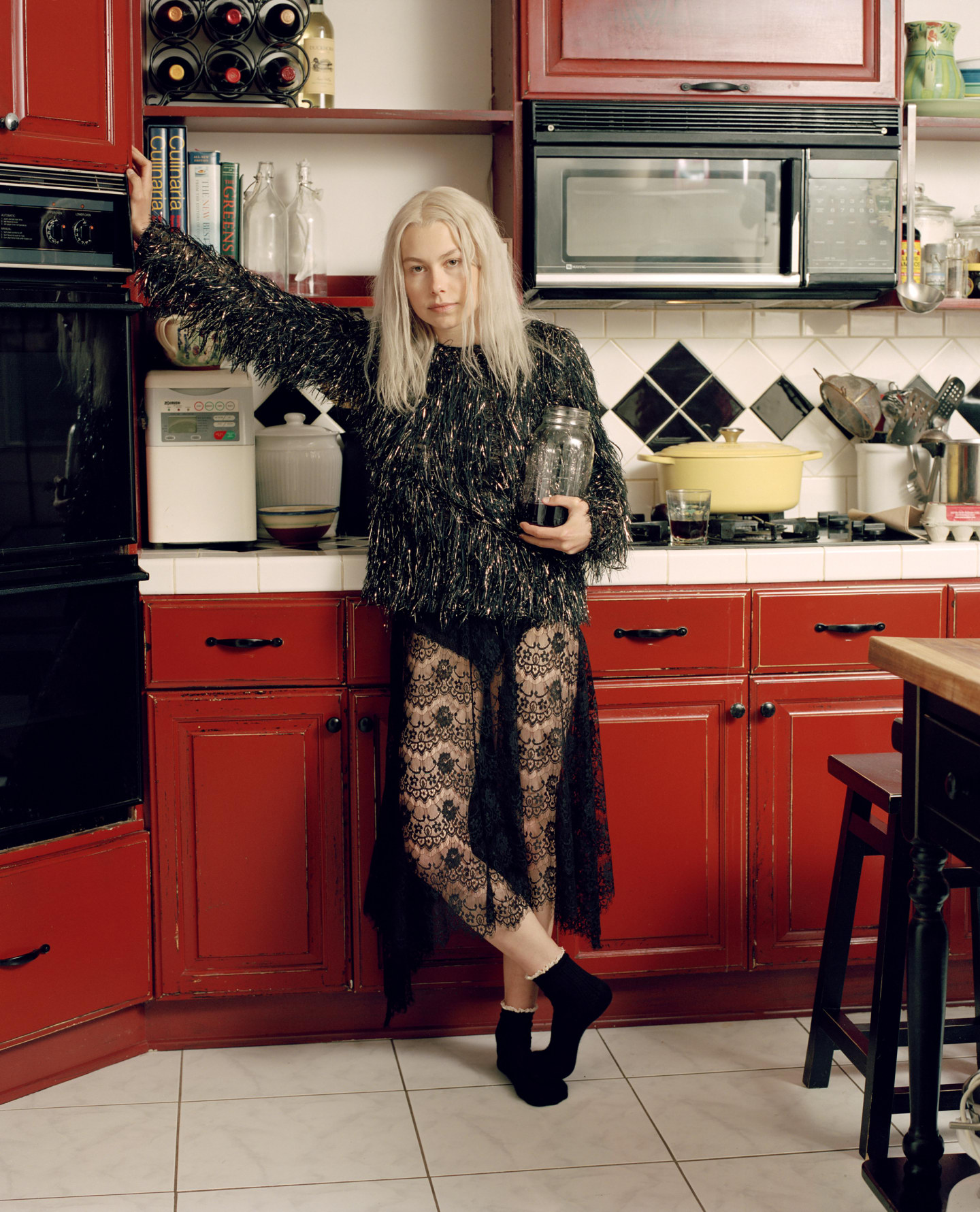 Sweater MANSUR GAVRIEL, underwear ERES, skirt BREELAYNE, socks PHOEBE’S OWN.
Sweater MANSUR GAVRIEL, underwear ERES, skirt BREELAYNE, socks PHOEBE’S OWN.
Now, as Phoebe prepares herself for a year on the road, she’s working on her follow-up album any chance she gets. “It’s hard for me to live out the things I say I should do,” she says. “I have a lot of anxiety related to writing. It’s really hard to be honest with yourself. It’s intense. It’s hard to include that in my day sometimes.” She talks fondly about her apartment and the simple routines she keeps: waking up early to work on music, then talking a long walk around her neighborhood once she has expelled a big chunk of herself into new songs. “I write in the morning now,” she says. “So I have the day to blow off steam after exploring the weird, dark corners of my mind.”
Turning those dark corners of the mind into elegiac songs came from years of Phoebe studying her heroes, many of whom became collaborators and supporters. But unlike those guys and their well-worn legends — whether it’s Elliott or Conor or Ryan — Phoebe’s story isn’t of a suffering boy genius who drifted from middle-of-nowhere America into the indie rock spotlight. She’s mythologized in her own way, both a reflection and a rejection of the past, where even the skeptics are intrigued by her effortlessness.
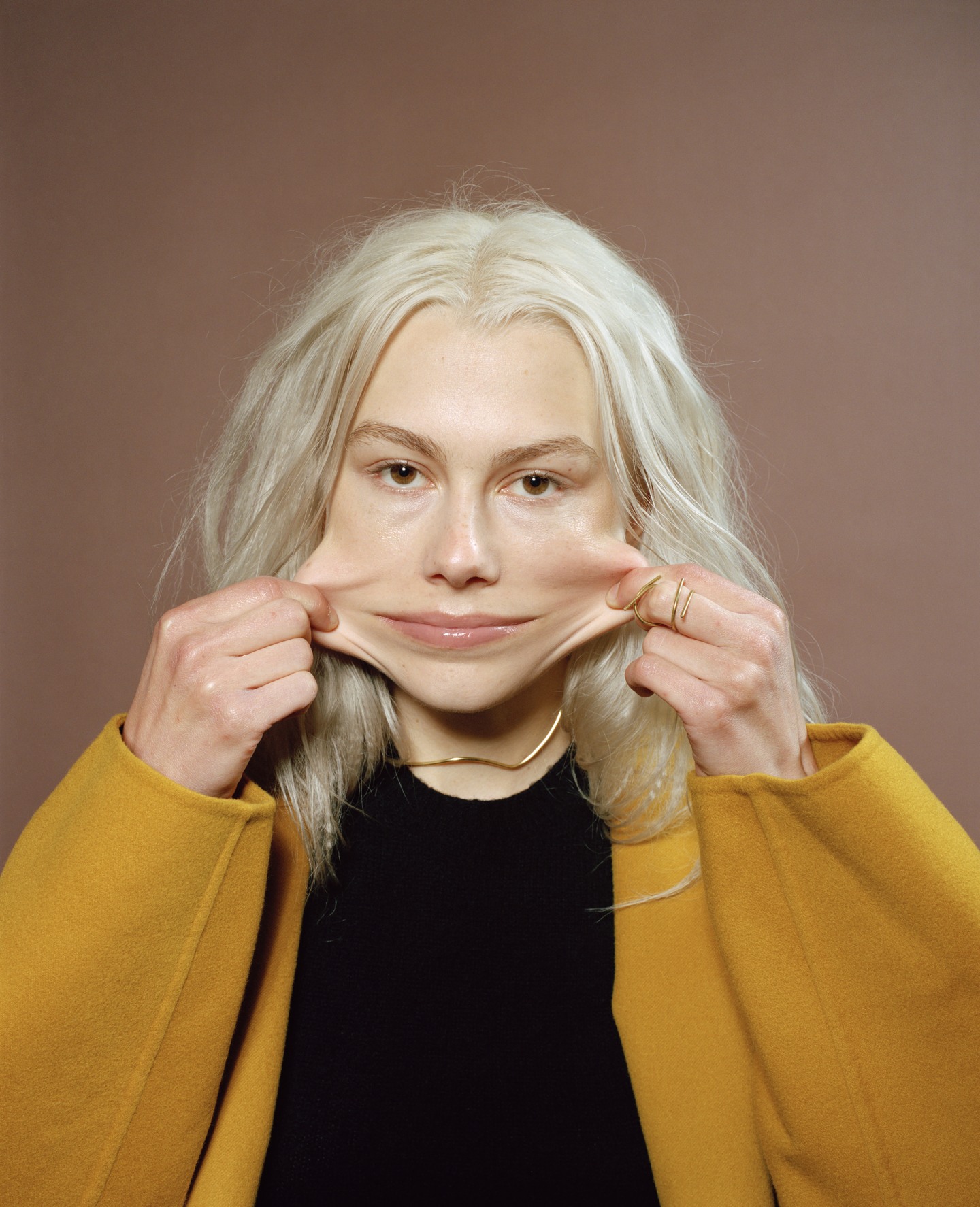 Sweater ACNE STUDIOS, coat MANSUR GAVRIEL, choker EYDE.
Sweater ACNE STUDIOS, coat MANSUR GAVRIEL, choker EYDE.